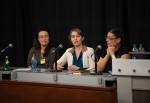Experts on sexual violence said colleges should use alternative methods, such as restorative and transformative justice, to address sexual violence on campus.
The Campus Assault Resource and Education program hosted an event Tuesday featuring a panel of speakers who discussed their experiences working with restorative and transformative justice for college students, followed by a Q&A session. CARE is an on-campus program that aims to provide a confidential place for survivors of sexual assault and similar crimes to speak about their experiences without filing a formal report.
Restorative and transformative justice are alternative options when navigating the aftermath of sexual violence in lieu of incarceration, in which survivors work with family members, friends and other members of the community to address the violence.
According to the Centre for Justice and Reconciliation, restorative justice involves stressing accountability and sometimes facilitating meetings between the perpetrator and the survivor.
On the other hand, transformative justice allows communities to prevent violence, said LeAnn Pham, a fourth-year political science and Asian American studies student who attended the event.
“Transformative justice is seeking incremental cultural change before the violence happens,” Pham said. “There is more counseling and a facilitator with the emotional capacity for people to come to an agreement.”
It can be difficult to alter one’s perception of justice, said Grace Hong, panel moderator and a professor of gender studies and Asian American studies at UCLA.
Hong said her first instinct when hearing about the Larry Nassar case at Michigan State University was anger. Nassar was the former physician of the United States national gymnastics team who was accused of sexually assaulting over 265 women and sentenced to prison for 40 to 175 years.
“My first instinct is, ‘Throw them in jail and toss them in prison,’ … when you hear about something that’s so violent and has affected so many people,” Hong said.
Hong said it is normal to feel anger and other emotions when using transformative justice to talk about these topics and to heal from them.
Xhercis Mendez, an assistant professor of women and gender studies at California State University, Fullerton, was another panelist at the event and said many problems with sexual assault on campus happen because university administrators don’t pay enough attention to the issue.
“The way the university pays attention is when it is in crisis mode,” Mendez said.
The event was focused on topics different from the traditional avenues for criminal justice, such as the Title IX office or the police, in case people are looking for different options for sexual assault and related crimes, said Alicia Oeser, director of CARE.
“I wanted to bring these speakers into our community because I think there is a really important piece that people are hungry for, a better way of engaging with others,” Oeser said. “People are hoping for something else.”
Michaela Banchero, a second-year psychobiology student, said she liked how the speakers gave students a platform to discuss these ideas.
“I really liked that they tried to give students a platform because often the university doesn’t enable us,” Banchero said.
Pham said she thought the event was informative and enjoyed it as someone who studies both restorative and transformative justice, but said she thought some of the theories discussed in the panel may have confused students.
“One of the panelists talked a lot about theories,” Pham said. “That’s great, but when talking to a lot of students there is not enough time to explain the theory all the way.”
Mendez said she wanted to emphasize that restorative justice takes a safe community and open-minded people to function properly.
“Restorative justice is something that you have to come to voluntarily, and we have to create those conditions,” Mendez said.
